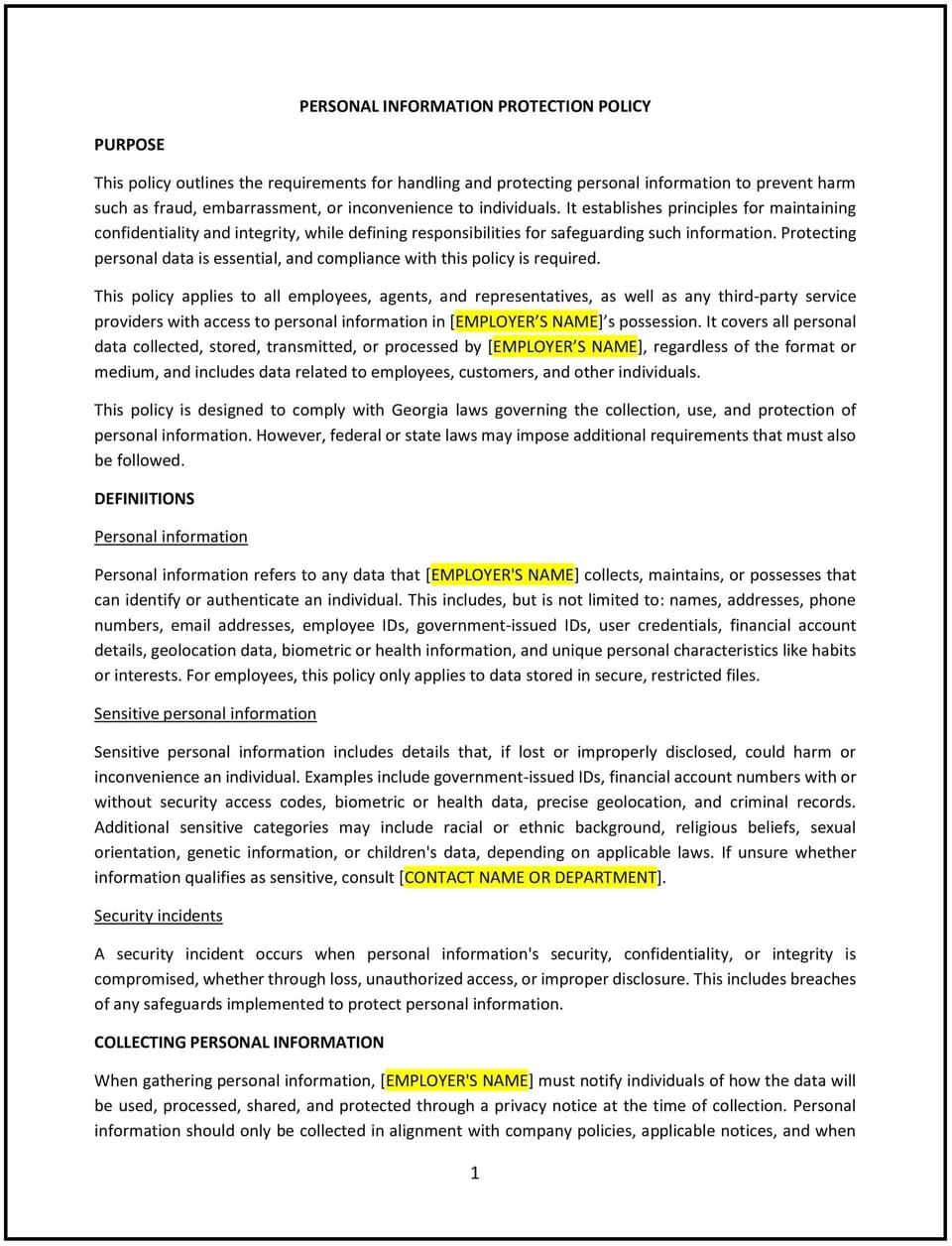Personal information protection policy (Georgia): Free template

Personal information protection policy (Georgia)
This personal information protection policy is designed to help Georgia businesses safeguard sensitive employee, customer, and company data. The policy outlines measures for data collection, storage, access, and disposal to minimize risks and promote trust.
By implementing this policy, businesses can protect sensitive information, mitigate risks, and maintain ethical data management practices.
How to use this personal information protection policy (Georgia)
- Define personal information: Specify what constitutes personal information, such as Social Security numbers, financial data, and contact details.
- Limit data collection: Collect only the information necessary for business purposes and maintain transparency about how it will be used.
- Establish access controls: Restrict access to personal information to authorized personnel only and implement secure authentication methods.
- Secure data storage: Use encryption, secure servers, and other safeguards to protect stored information from unauthorized access or breaches.
- Develop retention policies: Specify how long personal information will be retained and establish processes for secure disposal when no longer needed.
- Provide training: Educate employees on data protection practices, such as recognizing phishing attempts and handling sensitive information responsibly.
- Monitor and audit: Conduct regular audits to ensure data protection measures are effective and address any vulnerabilities.
- Review and update regularly: Periodically assess the policy to reflect changes in Georgia-specific data protection regulations, technology, or business practices.
Benefits of using this personal information protection policy (Georgia)
Implementing this policy provides several advantages for Georgia businesses:
- Protects sensitive information: Prevents unauthorized access, misuse, or breaches of personal data.
- Builds trust: Employees and customers feel secure knowing their data is managed responsibly.
- Reduces legal risks: Clear data protection measures minimize the risk of regulatory violations or liability.
- Enhances reputation: A commitment to data security strengthens the business’s credibility.
- Reflects Georgia-specific needs: Tailoring the policy to local practices and legal requirements ensures its practicality and relevance.
Tips for using this personal information protection policy (Georgia)
- Use encryption: Encrypt sensitive data both in transit and at rest to prevent unauthorized access.
- Develop incident response plans: Create a clear process for addressing data breaches or security incidents.
- Communicate policies: Ensure employees and customers understand how their data is protected and their rights under this policy.
- Implement secure access: Use multi-factor authentication and regular password updates to enhance security.
- Address vendor risks: Vet third-party vendors to ensure they follow equivalent data protection practices.
Q: What is considered personal information under this policy?
A: Personal information includes data such as Social Security numbers, financial information, health records, and contact details.
Q: How should businesses restrict access to personal information?
A: Access should be limited to authorized personnel who require the data for legitimate business purposes, with secure authentication methods in place.
Q: What steps should businesses take to secure data storage?
A: Businesses should use encrypted storage, secure servers, and regular backups to protect sensitive information.
Q: How long should businesses retain personal information?
A: Businesses should retain personal information only as long as necessary for business purposes and securely dispose of it when no longer needed.
Q: What should businesses do in the event of a data breach?
A: Businesses should follow an incident response plan, which includes notifying affected parties, addressing vulnerabilities, and reporting the breach to appropriate authorities if required.
Q: How often should businesses conduct audits of their data protection measures?
A: Regular audits should be conducted at least annually or whenever significant changes occur in data protection practices or technology.
Q: How often should this policy be reviewed?
A: The policy should be reviewed annually or as needed to reflect changes in Georgia data protection regulations or business practices.
This article contains general legal information and does not contain legal advice. Cobrief is not a law firm or a substitute for an attorney or law firm. The law is complex and changes often. For legal advice, please ask a lawyer.


